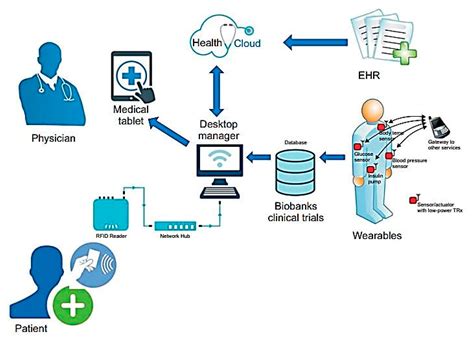The healthcare industry is on the cusp of a revolution, driven by the increasing adoption of smart devices. These innovative tools are transforming the way healthcare is delivered, making it more efficient, effective, and patient-centric. From remote monitoring and telemedicine to personalized medicine and predictive analytics, smart devices are opening up new avenues for improving healthcare outcomes.
The potential of smart devices in healthcare is vast and varied. For instance, wearable devices such as fitness trackers and smartwatches can monitor patients' vital signs and activity levels, enabling early detection of health anomalies. Similarly, mobile apps can facilitate remote consultations, reducing the need for hospital visits and enhancing patient engagement. Moreover, advanced analytics and machine learning algorithms can help identify high-risk patients, predict disease progression, and personalize treatment plans.
Despite the numerous benefits, the integration of smart devices into healthcare also raises important questions about data security, interoperability, and regulatory compliance. As the industry continues to evolve, it is essential to address these challenges and ensure that smart devices are used in a way that prioritizes patient safety, privacy, and well-being.
The Evolution of Smart Devices in Healthcare
The use of smart devices in healthcare is not a new phenomenon. However, recent advances in technology have led to a significant increase in their adoption and application. Several factors have contributed to this trend, including the widespread availability of smartphones, the development of more sophisticated sensors and algorithms, and the growing need for cost-effective and patient-centered care.

One of the earliest examples of smart devices in healthcare is the use of telemedicine platforms. These platforms enable remote consultations between patients and healthcare providers, reducing the need for hospital visits and enhancing patient engagement. Telemedicine has been particularly effective in rural areas, where access to healthcare services is limited.
Another significant development is the emergence of wearable devices, such as fitness trackers and smartwatches. These devices can monitor patients' vital signs, activity levels, and sleep patterns, providing valuable insights into their overall health and well-being. Wearable devices have been shown to improve patient outcomes in various areas, including chronic disease management, rehabilitation, and mental health.
The Benefits of Smart Devices in Healthcare
The integration of smart devices into healthcare offers numerous benefits, including:
- Improved patient outcomes: Smart devices can enhance patient engagement, improve medication adherence, and facilitate early detection of health anomalies.
- Increased efficiency: Smart devices can automate routine tasks, reduce paperwork, and enhance communication between healthcare providers.
- Enhanced patient safety: Smart devices can monitor patients' vital signs, detect potential health risks, and alert healthcare providers to take prompt action.
- Reduced costs: Smart devices can reduce hospital readmissions, minimize the need for unnecessary tests and procedures, and promote more efficient use of healthcare resources.

Applications of Smart Devices in Healthcare
Smart devices have a wide range of applications in healthcare, including:
- Remote monitoring: Smart devices can monitor patients' vital signs, activity levels, and sleep patterns, enabling early detection of health anomalies.
- Telemedicine: Smart devices can facilitate remote consultations between patients and healthcare providers, reducing the need for hospital visits and enhancing patient engagement.
- Personalized medicine: Smart devices can provide valuable insights into patients' genetic profiles, enabling personalized treatment plans and more effective disease management.
- Predictive analytics: Smart devices can analyze large datasets, identify high-risk patients, and predict disease progression, enabling early intervention and more effective treatment.

Challenges and Limitations
Despite the numerous benefits of smart devices in healthcare, there are also several challenges and limitations that need to be addressed. These include:
- Data security: Smart devices can generate vast amounts of sensitive data, which must be protected from unauthorized access and cyber threats.
- Interoperability: Smart devices from different manufacturers may not be compatible with each other, creating challenges for healthcare providers and patients.
- Regulatory compliance: Smart devices must comply with relevant regulations, including HIPAA and FDA guidelines.

Future Directions
The future of smart devices in healthcare is promising, with several emerging trends and technologies expected to shape the industry. These include:
- Artificial intelligence: AI-powered algorithms can analyze large datasets, identify high-risk patients, and predict disease progression.
- Internet of Things (IoT): IoT devices can monitor patients' vital signs, detect potential health risks, and alert healthcare providers to take prompt action.
- 5G networks: 5G networks can enable faster data transfer rates, reduce latency, and enhance the overall performance of smart devices.

Conclusion
The integration of smart devices into healthcare is a promising new frontier, offering numerous benefits and opportunities for improving patient outcomes. However, it is essential to address the challenges and limitations of smart devices, including data security, interoperability, and regulatory compliance. As the industry continues to evolve, it is likely that smart devices will play an increasingly important role in shaping the future of healthcare.






What are smart devices in healthcare?
+Smart devices in healthcare refer to the use of advanced technologies, such as wearable devices, telemedicine platforms, and predictive analytics, to improve patient outcomes and enhance the delivery of healthcare services.
What are the benefits of smart devices in healthcare?
+The benefits of smart devices in healthcare include improved patient outcomes, increased efficiency, enhanced patient safety, and reduced costs.
What are the challenges and limitations of smart devices in healthcare?
+The challenges and limitations of smart devices in healthcare include data security, interoperability, and regulatory compliance.
